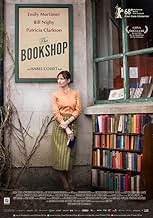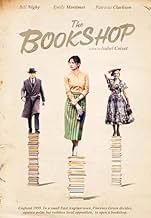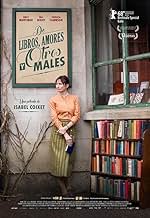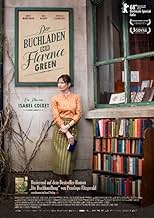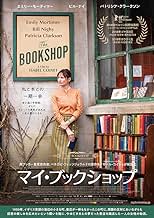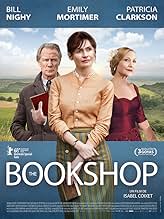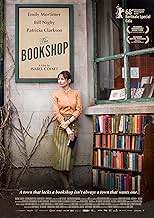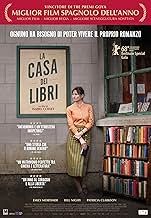The Bookshop
- 2017
- Tous publics
- 1h 53m
IMDb RATING
6.5/10
18K
YOUR RATING
England 1959. In a small East Anglian town, Florence Green decides, against polite but ruthless local opposition, to open a bookshop.England 1959. In a small East Anglian town, Florence Green decides, against polite but ruthless local opposition, to open a bookshop.England 1959. In a small East Anglian town, Florence Green decides, against polite but ruthless local opposition, to open a bookshop.
- Director
- Writers
- Stars
- Awards
- 14 wins & 33 nominations total
- Director
- Writers
- All cast & crew
- Production, box office & more at IMDbPro
Featured reviews
The three main stars put in stellar performances, Emily Mortimer in particular shows her true acting colours in this aged tale about class and corruption.
I love the story, the direction, the acting, and the way it shows at the end that despite all the corruption and badness in humans, one can touch another one in their life for a short period of time, and have a lasting positive impact on them for the rest of their lives.
Beautifully done and my only regret is that I can't see it again for the first time.
I have never bothered to write a review before so here it is. A young widow of 16 years pursues her dream of owning and operating a bookshop in a fictional village, Hardbourough, Suffolk, UK.. She, Mrs. Green, is a woman of integrity, (Emily Mortimer). We come to know her by how she treats others and the developing relationships she has in this new town of hers. The young people of the story, Christine, the young local girl working in the bookshop, even though she doesn't like to read. The young boy, Wally, running errands and delivering correspondence from Florence to Mr. Brundish (Bill Nighy). They come to admire Florence Green, seeing her courage as she goes against the wishes of the local socialite, Violet Gamart. (Patricia Clarkson) . Violet is a nasty piece of work invoking a deep disdain in ones emotions. The story is full of examples of strength of the human spirit and how good eventually overcomes wickedness in unpredictable ways. The last scenes make the entire film worth watching,(a tad slow I'll admit) , until you get there and unexpectedly see how this charming story delightfully ends.
Echoes of Dylan Thomas' Under Milkwood whisper throughout the deliciously slow film The Bookshop (2017), a village drama that captures the essence of old-world Britishness. If narrative action is important to you there is little to see here, but if you enjoy character portraits you will love this inconsequential tale told beautifully.
Set in a sleepy 1959 seaside port, young widow Florence Green (Emily Mortimer) arrives determined to overcome her grief and open a small bookshop. The town has never had a bookshop and most of the villagers don't like books anyway, except for the reclusive Mr Brundish (Bill Nighy) who reads everything he can. After pushing through a wall of petty officials the shop opens in a run-down cottage despite fierce opposition from the imperious Mrs Gamart (Patricia Clarkson). She wants the cottage reclaimed as an arts centre, so battle-lines are drawn between small-mindedness and the winds of change.
At times the story slows down so much that it almost stops, just to watch tall grass swaying in the wind or to hear leaves sighing on trees. The camera lingers in the space between words or glances, or it traverses shelves full of books with titles hinting that change is coming. Even the film's highlight romantic scene is little more than agonisingly tender moments that evaporate into the ether. Fortunately, the cinematography is up to the challenge of capturing mood and nuance as it dwells on Bradbury's dystopian Fahrenheit 451 (1953)and Nabokov's controversial Lolita (1955)to telegraph the post-war social transformation that is underway elsewhere.
Instead of pushing the narrative forward, the film prefers to dwell on archetypal caricatures of small people in small places. A smug gadabout, a banker nicknamed Mr Potato Head, a smelly fishmonger, a precocious teenager, a dithering lawyer, the snobbish and manipulative Mrs Gamart, and of course, the incurable romantic Mr Brundish. While these are portrayed with a light brush, it is Florence who holds our attention for the depth of her vanguard feminist courage and self-belief. The entire cast is well chosen, but Emily Mortimer is the film's undoubted shining star.
It might be argued that Bill Nighy is such an icon of British movies that he overpowers any given role simply by being a composite of every other persona he has ever played. In other words: he is always Bill Nighy. But that is a minor distraction in an otherwise flawlessly directed, slow-burning village drama of how books and ideas can change the world we live in. It is not recommended, however, for anyone who does not have the time or need to stop and smell flowers or watch boats sail by.
Set in a sleepy 1959 seaside port, young widow Florence Green (Emily Mortimer) arrives determined to overcome her grief and open a small bookshop. The town has never had a bookshop and most of the villagers don't like books anyway, except for the reclusive Mr Brundish (Bill Nighy) who reads everything he can. After pushing through a wall of petty officials the shop opens in a run-down cottage despite fierce opposition from the imperious Mrs Gamart (Patricia Clarkson). She wants the cottage reclaimed as an arts centre, so battle-lines are drawn between small-mindedness and the winds of change.
At times the story slows down so much that it almost stops, just to watch tall grass swaying in the wind or to hear leaves sighing on trees. The camera lingers in the space between words or glances, or it traverses shelves full of books with titles hinting that change is coming. Even the film's highlight romantic scene is little more than agonisingly tender moments that evaporate into the ether. Fortunately, the cinematography is up to the challenge of capturing mood and nuance as it dwells on Bradbury's dystopian Fahrenheit 451 (1953)and Nabokov's controversial Lolita (1955)to telegraph the post-war social transformation that is underway elsewhere.
Instead of pushing the narrative forward, the film prefers to dwell on archetypal caricatures of small people in small places. A smug gadabout, a banker nicknamed Mr Potato Head, a smelly fishmonger, a precocious teenager, a dithering lawyer, the snobbish and manipulative Mrs Gamart, and of course, the incurable romantic Mr Brundish. While these are portrayed with a light brush, it is Florence who holds our attention for the depth of her vanguard feminist courage and self-belief. The entire cast is well chosen, but Emily Mortimer is the film's undoubted shining star.
It might be argued that Bill Nighy is such an icon of British movies that he overpowers any given role simply by being a composite of every other persona he has ever played. In other words: he is always Bill Nighy. But that is a minor distraction in an otherwise flawlessly directed, slow-burning village drama of how books and ideas can change the world we live in. It is not recommended, however, for anyone who does not have the time or need to stop and smell flowers or watch boats sail by.
Florence Green (Emily Mortimer) is a widow who dreams of opening a modest bookshop in a tiny Sussex seaside town, which by 1959 is virtually cut off from the outside English literature world. Florence is kindhearted to a fault, and because she lacks that needed killer business savvy, and instead possesses great naivety by first hiring a ten (10) year old girl named Christine (Honor Kneafsey) who is physically removed from her school classroom for being under aged and gainfully employed. Florence next hires a smarmy unemployed Milo North (James Lance) who has a hidden agenda for his willingness to take the job at the pay grade that his ten year old predecessor was making, which should have set off warning bells for the naive yet generous bookshop owner Florence.
This is the story between pure goodness (Emily Mortimer) and her dream of opening a bookshop for the townspeople more than for herself and lack of want for a successful business, and the sheer vindictiveness when a rich woman Violet Gamart (Patricia Clarkson) wants to remove the recently opened bookshop and replace it with a ridiculous arts center.
Florence does have a small cloister of bookshop supporters, none greater than a recluse widower named Edmund Brundish (Bill Nighy) but Florence is out matched by the social status and wealth of the vindictive Violet Gamart who takes any and all means of usurping both old and newly creative bylaws to oust Florence and her bookshop for her own vanity project, the arts center.
Mrs. Shullivan and I were both brokenhearted and ecstatic with how the film ends, so no spoilers will be forthcoming. See the bookshop for yourself and you become the critic. As for myself, I give the bookshop a 7 out of 10 rating for its warmth of story line and worthy ending for a good versus evil film.
This is the story between pure goodness (Emily Mortimer) and her dream of opening a bookshop for the townspeople more than for herself and lack of want for a successful business, and the sheer vindictiveness when a rich woman Violet Gamart (Patricia Clarkson) wants to remove the recently opened bookshop and replace it with a ridiculous arts center.
Florence does have a small cloister of bookshop supporters, none greater than a recluse widower named Edmund Brundish (Bill Nighy) but Florence is out matched by the social status and wealth of the vindictive Violet Gamart who takes any and all means of usurping both old and newly creative bylaws to oust Florence and her bookshop for her own vanity project, the arts center.
Mrs. Shullivan and I were both brokenhearted and ecstatic with how the film ends, so no spoilers will be forthcoming. See the bookshop for yourself and you become the critic. As for myself, I give the bookshop a 7 out of 10 rating for its warmth of story line and worthy ending for a good versus evil film.
Lovely film for me. slow paced but full of meaning and reflecting society's power when it wants to reject something new and not in the order of usual expectations.
It may stirs your emotions and make you wonder why some people can be so stoic but can keep their own emotion into a very reasonable check. Although you may witness some outburst but you will not see an easy surrender or long winded retaliation.
I wish those who are so critical of such work make it as a personal observation instead of making themselves authority in this art.
We don't all have the same taste, upbringing and education so we don't share the same appreciation.
Did you know
- TriviaThe narrator is Julie Christie. A half century earlier, Ms Christie starred in the film Fahrenheit 451 (1966), adapted from the Ray Bradbury novel that was prominently featured in Bookshop.
- GoofsInside the bookshop, modern Penguin Clothbound Classics can be seen on the shelves. These editions were put out in the last 20 years, bound to look like older styles, but are, indeed, recent publications.
- Quotes
Edmund Brundish: Old age is not the same thing as historical interest. Otherwise you and I would be far more interesting than we are.
- How long is The Bookshop?Powered by Alexa
Details
- Release date
- Countries of origin
- Official sites
- Language
- Also known as
- La librería
- Filming locations
- Portaferry, County Down, Northern Ireland, UK(Town of Hardborough exteriors)
- Production companies
- See more company credits at IMDbPro
Box office
- Budget
- $5,400,000 (estimated)
- Gross US & Canada
- $1,588,150
- Opening weekend US & Canada
- $75,736
- Aug 26, 2018
- Gross worldwide
- $12,062,146
- Runtime1 hour 53 minutes
- Color
- Aspect ratio
- 1.85 : 1
Contribute to this page
Suggest an edit or add missing content




